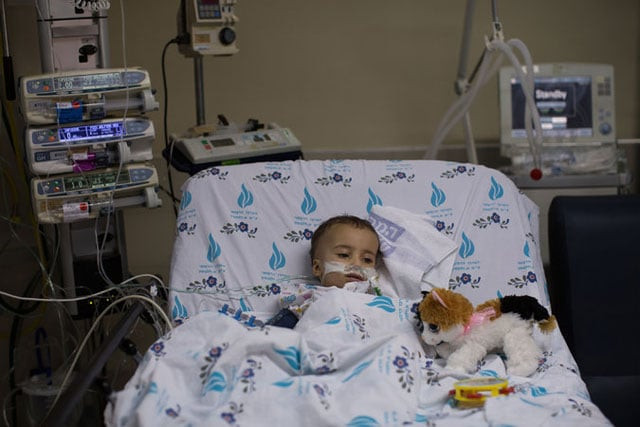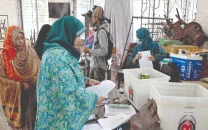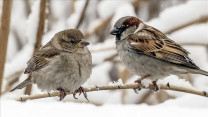Unlikely Facebook friendships save Afghan baby with heart defects
An Afghan baby living in Peshawar had been born with his two main arteries reversed and two holes in his heart

PHOTO: NEW YORK TIMES
A 14-month-old Afghan baby living in Peshawar was born with two reversed main arteries and two holes in his heart. Yehia’s parents found a local specialist who could perform the necessary surgery at a cost of $7,000. With just $200 in savings and already indebted with costly medical bills, the family requested a relative for help in Afghanistan during a visit to Jalalabad.
 PHOTO: NEW YORK TIMES
PHOTO: NEW YORK TIMESHeartbreaking photo of Syrian boy draws attention to Aleppo
Farhad Zaheer, a teacher in Jalalabad who speaks English and is active on social media agreed to help the family. “No problem,” Zaheer, 29, recalls telling them. “I said, I know lots of people and I will contact them.’”
Among the people he contacted was Anna Mussman, 69, who has both American and Israeli citizenship. Zaheer had sent Mussman a friend request in 2012 after he worked on a project training teachers in Afghanistan's Nuristan province, which Mussman was overseeing for the State Department. He remembered her, he said, because she commented kindly on his posts.
“Hello dear Madam!” Zaheer wrote in a Facebook message with a photo of young Yehia attached. “This boy is my cousin who has been suffering from a hole in heart. If you can do anything for his good health, we would be very thankful to you.” Mussman, who was born to Holocaust survivors at a camp for the displaced in Germany, jumped at the opportunity. Within a few hours, she had contacted Simon Fisher, the executive director of Save a Child’s Heart, an Israeli charity that she had once heard about on CNN. The organisation provides free surgery to children from developing countries.
Children in Syria’s Madaya await urgent medical help
“I realise helping a child from a country which Israel has no diplomatic relations is not easy, but perhaps possible,” Mussman wrote to Fisher in an email. “Thanks so much and Shabbat Shalom.”
Fisher, drawing on years of contacts, obtained Israeli visas for Yehia and his father after Mussman contacted him. But this entailed travelling through Turkey, since Afghanistan has no diplomatic relations with Israel.
Mussman had put Zaheer in touch with Iranian-American Fary Moini who had worked in Jalalabad and had connections there. Mussman had met Moini during a stint in Jalalabad. At Zaheer’s request, Moini wrote a moving letter to the diplomat, who she did not know, pleading for visas for Yehia and his father. Within a day, Zaheer picked them up.
Heartwarming pictures show children celebrating Eid in war-torn Syria
Unaware of the efforts underway, back in Jalalabad, Zaheer contacted Michael Davidson, another Israeli Facebook connection he had never met. Davidson, 70, emigrated from India in 1978 — and speaks Urdu. Along with Davidson, Moini, Gul, a relative of Fisher’s friend Yossi Betsalel, was also at hand in Holon for the surgery.
 PHOTO: NEW YORK TIMES
PHOTO: NEW YORK TIMES PHOTO: NEW YORK TIMES
PHOTO: NEW YORK TIMES PHOTO: NEW YORK TIMES
PHOTO: NEW YORK TIMESYahyu Mekonnen, 33, an Ethiopian surgeon, opened Yehia’s chest. Lior Sasson, who headed an operating team of nearly a dozen people, hummed an Israeli song while they stopped his tiny heart to patch it up. Eventually, they wheeled Yehia out, covered in bandages, even over his eyes. His father was surrounded by a makeshift family he had only just met. “You can cry,” Davidson urged.
This article originally appeared on New York Times, a partner of The Express Tribune.



















COMMENTS
Comments are moderated and generally will be posted if they are on-topic and not abusive.
For more information, please see our Comments FAQ